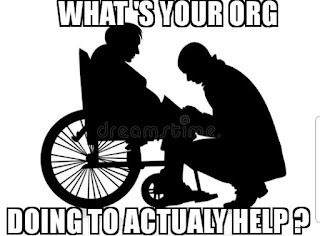What is your organisation doing to help those with disabilities meet thier need?
Are you disabled? How often do you hear we want to
hear your issues, please participate in this consultation, come and visit our
stand ring us for help and then get signposted elsewhere.
We've found quite a few local organisations heavily funded by the local authorities, who will help at advocacy, wellbeing services and carers’ services. But again when how many people locally asked have benefited from what they provide the answers seem to be vague! When I say benefited I mean a real difference, helped them with forms, written letters, actually argued their case at all levels, advised and helped people actually get the benefits and support they are entitled too.
Not just benefits but actually made a positive difference by improving a service, whether through access or taking up the concerns with the powers that be and asking for appropriate answers.
When I say represent I don’t mean just talked to them or passed them to another service acting as a signpost, but helped them get the money they deserve? Fight for their rights? It's not easy knowledge and training is required. But we believe the help you give should actually make it an actual difference to the people you’re helping, and quantifiable so that it can be judged and evaluated.
I firmly believe that the direct cost of your organisation must equate to at least in the same outputs. So if your business turnover is say £50k then you should be able to show that your clients have actually benefited, via increase in benefits, equipment or actual support to the same value. I don’t mean just friendly get together for tea. One of the excuses I often here is lack of insurance. To me it’s just that an excuse. Go get insurance.
Locally there is only one organisation who strive to support via personal budget services again at a charge. We have shied away from this and at every opportunity will promote direct payments and self-care either by themselves or via family. Ensuring all the money available is used for the benefit of the service user.
I firmly believe for personal budgets to work, it has to be personal, not given away to some other organisations to manage. If that is done then all you've done moved the post from LA/NHS to a private company who hopes to make a profit. If there's a profit element then the customer will always loose out.
It's time for disability organisations to have a look at themselves and actually evaluate what they are doing. Is it actually benefiting anyone, or is it a service that looks shiny on the outside but there isn't much depth to it.
The first rule to dealing with or giving assistance to disabled people hasn't changed, it's always been the same, yet most organisations forget this. Just in case you need a reminder ask the disabled person what he needs, don't decide for them.
We've found quite a few local organisations heavily funded by the local authorities, who will help at advocacy, wellbeing services and carers’ services. But again when how many people locally asked have benefited from what they provide the answers seem to be vague! When I say benefited I mean a real difference, helped them with forms, written letters, actually argued their case at all levels, advised and helped people actually get the benefits and support they are entitled too.
Not just benefits but actually made a positive difference by improving a service, whether through access or taking up the concerns with the powers that be and asking for appropriate answers.
When I say represent I don’t mean just talked to them or passed them to another service acting as a signpost, but helped them get the money they deserve? Fight for their rights? It's not easy knowledge and training is required. But we believe the help you give should actually make it an actual difference to the people you’re helping, and quantifiable so that it can be judged and evaluated.
I firmly believe that the direct cost of your organisation must equate to at least in the same outputs. So if your business turnover is say £50k then you should be able to show that your clients have actually benefited, via increase in benefits, equipment or actual support to the same value. I don’t mean just friendly get together for tea. One of the excuses I often here is lack of insurance. To me it’s just that an excuse. Go get insurance.
Locally there is only one organisation who strive to support via personal budget services again at a charge. We have shied away from this and at every opportunity will promote direct payments and self-care either by themselves or via family. Ensuring all the money available is used for the benefit of the service user.
I firmly believe for personal budgets to work, it has to be personal, not given away to some other organisations to manage. If that is done then all you've done moved the post from LA/NHS to a private company who hopes to make a profit. If there's a profit element then the customer will always loose out.
It's time for disability organisations to have a look at themselves and actually evaluate what they are doing. Is it actually benefiting anyone, or is it a service that looks shiny on the outside but there isn't much depth to it.
The first rule to dealing with or giving assistance to disabled people hasn't changed, it's always been the same, yet most organisations forget this. Just in case you need a reminder ask the disabled person what he needs, don't decide for them.



Comments
Post a Comment